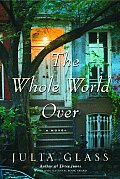
Way back in April, as I was looking through the Coming Soon literature "aisle" at Powells.com, I made a note that Julia Glass had written a new book, The Whole World Over. Her debut— Three Junes, a masterful, intricately woven novel of a Scottish family—won the National Book Award in 2002. When a first novel wins a prestigious literary award, you pay attention.
Even though I made a note to read the book, I think this book chose me. I had checked it out from the library no fewer than four times before I cracked the spine, happy to carry it around as long as I could. In November or so, The Whole World Over appeared on the list for my alma mater's Conversation with Books, an evening of book discussion between four friends (sort of like a book group on stage with an audience). Coincidentally, I had the book in my possession—and I have been slowly, steadily reading it since then.
The emotional core of this novel is Greenie, a Greenwich Village-based chef, who is in apparent need of shaking up her life. Wooed away to New Mexico to cook for the governor, she leaves behind her psychotherapist husband, Alan, and her four-year-old son George. This move sets into action a series of events that changes the course of their lives. Written in rich, dense prose (Entertainment Weekly called the novel extravagantly long) that sometimes feels like swimming through molasses, Glass uses a lot of words, and somehow, they all seem utterly necessary.
Glass is gifted at weaving multiple storylines, the characters of which pass in and out of the each other’s stories. There’s Walter, Greenie’s gay friend who owns a neighborhood restaurant; Fenno McCleod, the bookstore owner who makes a guest appearance after starring in Three Junes; and Saga, a brain-damaged woman who rescues animals—each complexly drawn.
Places really stand out too. Greenwich Village offers brownstones, the bookshop, and a restaurant; Maine delivers a craggy island where Greenie’s family maintained a rustic cabin; and New Mexico serves up mountains, punctuating luminous skies.
The novel ends with a September 11 moment, and I’m not really sure what to make of it so I’ll leave it at that. Julia Glass doesn’t need comparisons—she’s won the sort of literary award that cements reputations, but I think anyone who likes Barbara Kingsolver will also like Glass.
I'm looking forward to hearing what the Conversation friends have to say about it on Monday evening.
3 comments:
Congrats on finishing the book, Jen! Your comments make me want to read it now.
I finished Suite Francaise last night. Wow. I'll bring it with me -- looking forward to tomorrow evening!
P.S. I'm still learning Blogger; I should preview my posts, because it looks like it doesn't allow editing once you "publish." I tried to italicize Suite Francaise, but it didn't work, so I'm reposting.
Thanks Caryl!
Can't wait to hear about Suite Francaise—congrats to you as well!
I'm also just learning Blogger. As you can see, I'm struggling with how to add an image from the web. Do you know how to do this??
Post a Comment